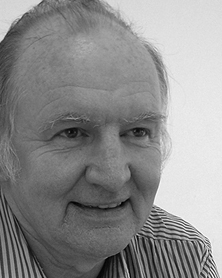Kevin Davey, author of Playing Possum and Radio Joan and co-author with Paul Anderson of Moscow Gold? The Soviet Union and the British left, was born in Shelley, Suffolk. He went to the University of Kent, Canterbury in 1976 to study Sociology and English, staying on to teach there and write an MPhil dissertation on the work of Raymond Williams.
He worked in FE colleges in Brixton and Hackney for the rest of the 1980s and has retained a connection to Hackney Community College for more than 30 years.
He was chair of the Socialist Society (1986-88) and chair of the Socialist Conferences in Chesterfield in 1987-88. He went on to work for Charter 88 and helped to create the online publishing network Open Democracy. Davey was a regular contributor to Tribune and New Statesman & Society in the 1980s and 1990s, and was editor of the radical monthly New Times from 1999 to 2000.
His book English Imaginaries:Anglo-British Approaches to Modernity, an investigation into changing forms of Englishness in the twentieth century, was published by Lawrence and Wishart in 2000. As a leading member of the Signs of the Times group in the 1990s he contributed ‘The Impermanence of New Labour’ to The Blair Agenda, (Lawrence and Wishart, 1996) and ‘Waking up to New Times’ to The Moderniser’s Dilemma, (Lawrence and Wishart, 1996), both edited by Mark Perryman; ‘Herbert Read and Englishness’ to Herbert Read Reassessed, (Liverpool University Press, 1998), edited by David Goodway; and ‘No Longer “Ourselves Alone” in Northern Ireland’ to British Cultural Studies, edited by David Morley and Kevin Robins (Oxford University Press, 2001).
From 2000 to 2009 Davey was the director of the Digital Incubator for London in Shoreditch, securing investment for early-stage technology businesses in the early years of Tech City. He was also a business journalist and publisher. He now lives in Whitstable and works as a consultant and coach for technology businesses and social enterprises across London and the south east. He is a fellow of the Royal Society of Arts.
PRAISE FOR PLAYING POSSUM
‘This playful postmodern escapade, deservedly shortlisted for the Goldsmiths prize, is inspired by the life, ideas and work of T S Eliot. The poet is thinly disguised as “bankerbard” Tom Stern, who flees to Whitstable after murdering his wife in London – or so it would seem. Davey collapses “time future” into “time past” so that it is both 1922 when Tom goes to Whitstable and also 90 years later as the film-maker narrator follows him there. Tom “climbs into the saddle of an iron horse” and the narrator sits down opposite him “in a strew of coffee beakers, pungent snacks, backpacks, beer cans and mobile phones”. The 1922 world is brilliantly conjured by the snatches of dialogue that pepper the text, and numerous references to music hall, jazz, Charlie Chaplin and Agatha Christie, as well as an illicit copy of Ulysses. All this context, and a multitude of allusions, make Playing Possum fascinating for Eliot scholars, but it is also enthralling for anyone willing to take the plunge into such a refreshingly unusual text.’
EMILY RHODES Guardian
‘Kevin Davey’s stupendous brain-teaser of a novel offers a stream of reflections on the life, work, thought, and mythology of T S Eliot… The novel is written with terrific fluency and tonal variety in a short-winded present tense, displaying a pronounced narrative emphasis on cinema, the art form that renders everything in a permanent now. He puts the mighty modernist back into his rowdy times, among the dancing and detective stories… Davey’s Eliot emerges as a creature and enabler of total fusion – an Anglo-American banker-poet desperate to conduct “the mind of Europe” in poems that eradicate the border between thought and feeling, plagiarism and originality, past and present, the classic and the new, populism and conservatism, high and low, rigour and impulse.’
LEO ROBSON New Statesman
‘This startlingly original debut novel has been shortlisted for this year’s Goldsmiths Prize alongside five other strong contenders – and deservedly so. In its formal daring and ludic complexity it aligns closely with the Goldsmiths’ remit “to reward fiction that breaks the mould or extends the possibilities of the novel form”… The book is an unalloyed pleasure, not merely for its myriad embedded references but for the light it throws on Eliots’s engagement with popular culture… Playing Possum is not just a spellbounding commentary on modernist writing but arguably a kind of apotheosis.’
DAVID COLLARD TLS
‘I love the eddies and volutes of his anfractuous prose.’
WILL SELF
‘A most stylish performance.’
TERRY EAGLETON
‘Wonderful. What a joy to read a book like Playing Possum in the waste land of contemporary fiction writing in Britain. And how exhilarating to read a novel in English that is so serious it is not afraid to be comic and even at times absurd.’
GABRIEL JOSIPOVICI
‘Playing Possum is a vastly energetic and confident book, a narrative that races along, packed with references and cross references mingling literature, film, time travel and visual art… Davey’s plot begins to tangle and gambol from the outset. The text – filled with dialogue, asides and allusions – is rich enough to repay rereading. Its time jumps and linguistic experimentation, its mosaic plot and dark humour is a joyful exploration of the novel’s boundaries as a form.’
A L KENNEDY
‘Playing Possum is hugely enjoyable and inventive. The precisely crafted prose crackles with exuberance, plays games with tones of voice, switches from po-faced parody to understated allusion. It is an exhilarating fairground big dipper of language and styles. I relished the energy of the writing and the inventiveness of the tale.’
BERNARD SHARRATT
‘The year is 1922, the same year The Waste Land was published. That poem is famously made up of snippets of overheard conversation and found quotations and there is a large slice of this in Playing Possum too. Part of the pleasure for students of Eliot will be in tracing the references. The novel is full of the most astonishing and vivid writing. It’s almost as if the author is channelling the spirit of 1922 directly on to the page, as if he’s fashioned a time telescope through which we can look in on the scene 90 years earlier.’
C J STONE
PRAISE FOR ENGLISH IMAGINARIES
‘With this book the debate about Englishness grows up. In his profound and engaging meditation Kevin Davey puts to shame most of the recent spate of essays on this fashionable theme.’
ANTHONY BARNETT
‘Kevin Davey’s remarkable blend of history, criticism and politics, ranging across literature, music, art, fashion, biography and cultural theory, is one of the most stimulating contributions to that new questioning. It is certainly among the most original. It deserves to be, and surely will be, one of the most influential.’
STEPHEN HOWE
‘An original and incisive analysis of the peculiarities of the English, offering a variety of new perspectives on both the pasts and possible futures of Anglo-Britishness.’
DAVID MORLEY
‘The shelves are currently overflowing with morbid and trivial pronouncements about Englishness. Kevin Davey’s book is a different cup of tea altogether. If we are to move through this protracted crisis of national identity and towards a plausible, plural and emphatically post-colonial sense of what it means to belong to this nation, then his creative and original insights will be indispensable.’
PAUL GILROY


